#ancient tablets
Explore tagged Tumblr posts
Text
The Ancient History of Astrology: Early Civilizations and The Stars
Astrology, an ancient practice that has captivated civilizations for centuries, holds a rich history deeply intertwined with the development of human civilization. From the earliest recorded civilizations to the present day, astrology has played a signifi
Astrology, an ancient practice that has captivated civilizations for centuries, holds a rich history deeply intertwined with the development of human civilization. From the earliest recorded civilizations to the present day, astrology has played a significant role in shaping our understanding of the cosmos and our place within it. In this blog post, we will delve into some of astrology’s earliest…
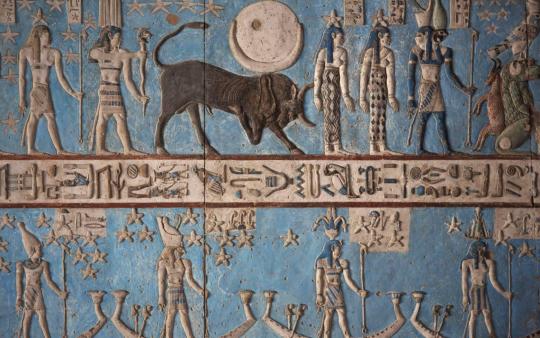
View On WordPress
#ancient astrology#ancient babylon#ancient china#ancient civilizations#ancient cultures#ancient egypt#ancient empires#ancient history#ancient india#ancient mesopotamia#ancient rome#ancient sumeria#ancient tablets#ancient texts#ancient wisdom#astral#Astrologer#astrology around the world#astrology chart#astrology in ancient history#astrology in early civilizations#astrology in human history#Astrology Reading#auras#babylonian#Babylonian astrology#Blog#cave paintings#cave paintings of astrology#chakras
9 notes
·
View notes
Text

1,600-year-old lead curse tablet in the Museo Archeologico Civico di Bologna, of unknown provenance. — "The first known surviving curse directed at a Roman senator. ... The text is written mainly in Latin with Greek invocations ... 'Crush, kill Fistus the senator,' part of the curse reads, 'May Fistus dilute, languish, sink and may all his limbs dissolve …' " — Image a composite of photo and drawing found at The History Blog
323 notes
·
View notes
Text
Magic in Ancient Greece: An Introduction
I have seen some people claim that magic or witchcraft did not exist in Ancient Greece. This is not the case. So, I thought I'd take the opportunity to introduce you all to the strange and wonderful world of Ancient Greek magic!
First, what do we mean by "magic"? Radcliffe Edmonds, one of the leading scholars on Ancient Greek magic, defines "magic" as "non-normative ritual behavior." In short, what makes something magic, and not just normal religion, is that people in a given culture think it's weird. The word "magic" itself refers to the magi, Zoroastrian priests — the Ancient Greeks thought they did magic because to them, Zoroastrianism was foreign and weird. They also thought that Ancient Egyptians could do magic for the same reason — what the Greeks thought was spooky magic was just normal religion in Egypt. Within their own culture, magic was basically heteropraxic religion. Magic was not considered hubristic, at least not inherently.
There are multiple Ancient Greek words that refer to magic. The word μάγος, magos, itself means "magician" or "charlatan." There's also γοητεία, goetia, usually translated as "sorcery." The word most often translated as "witchcraft" is φαρμακεία, pharmakeia, the use of drugs or herbs to transform or influence people. This is what Medea and Circe do.
One of our best sources on Ancient Greek magic is the Greek Magical Papyri, or PGM, a set of magical texts from Hellenistic Egypt. When I first learned about it, I thought it was too good to be true, but here it is: uncorrupted ancient pagan magic! Essentially, the PGM is one of the oldest known grimoires, and the ancestor of the entire Western magical tradition. The papyri contain spells and rituals for almost every purpose: curses, love spells, divination, dream oracles, summoning daimones, necromancy, even full mystical rites. Most of them include invocations to various gods, which are heavily syncretic. Helios/Apollo (treated interchangeably) is invoked the most often. Aphrodite appears pretty often, too. Hekate-Artemis-Selene-Persephone (conflated with a whole bunch of other chthonic goddesses, including Ereshkigal) has her own set of spells. You'll even find the names of Egyptian gods and Hebrew angels in there.
One of the most common features in PGM spells is voces magicae or barbarous names, nonsense words that are supposed to be the secret names of the gods, which give you the authority to call them up. They act almost like a written form of glossolalia. Most are supposed to be spoken or chanted aloud. Some sound like actual names, or are well-known magical epithets like ABRASAX. Some are just strings of Greek vowels. Some of them are palindromic; there's lots of spells that use the "abracadabra" disappearing-letter-triangle format. There's also charakteres, apparently-meaningless magical symbols, the distant ancestor of modern sigils.
Another major source for Ancient Greek magic are defixiones or katadesmoi, curse tablets. They're little lead leafs called lamellae, which are inscribed with curses and then deposited in wells, graves, and other chthonic places. Thousands of them have been found.

Here's the text of a curse tablet that invokes Hekate and Hermes Kthonios (copied from Curse Tablets and Binding Spells from the Ancient World by John G. Gager):
Hermes Khthonios and Hekate Khthonia Let Pherenikos be bound before Hermes Khthonios and Hekate Khthonia. I bind Pherenikos’ [girl] Galene to Hermes Khthonios and to Hekate Khthonia I bind [her]. And just as this lead is worthless and cold, so let that man and his property be worthless and cold, and those who are with him who have spoken and counseled concerning me. Let Thersilochos, Oinophilos, Philotios, and any other supporter of Pherenikos be bound before Hermes Khthonios and Hekate Khthonia. Also Pherenikos’ soul and mind and tongue and plans and the things that he is doing and the things that he is planning concerning me. May everything be contrary for him and for those counseling and acting with…
Another curse tablet, which invokes Hekate to punish thieves, includes a drawing of her and charakteres. This is how she's depicted:

From Curse Tablets and Binding Spells in the Ancient World by John G. Gager
It's supposed to be a woman with three heads and six raised arms, but to me it looks like Cthulhu, which is honestly appropriate.
There was a very fine line between love spells and curses in Ancient Greece. Some love spells in the PGM call upon the spirits of the dead and chthonic gods to torture a poor girl until she submits to the magician. Just as many defixiones attempt to forcefully bind a lover. But there's another, gentler kind of love spell described by Theocritus in Idylls, in which a witch named Simaetha invokes the Moon and Hekate and uses an iynx wheel to make a man love her.
If you want to know how to apply all of this in modern practice, I'm still working that one out. I've found the PGM very hard to adapt, because a lot of its requirements are dangerous or impractical. Many of its spells require gross ingredients worthy of the Scottish play, or plants that scholars can't identify, or procedures that I don't plan on attempting. And if you haven't noticed by now, most of them fly in the face of modern magical ethics. (Don't let anyone tell you that the gods will punish you for doing baneful magic, because that's clearly bullshit.) On the other hand, Crowley adapted his Bornless Ritual almost word-for-word from PGM V. 96—172. So far, the best resource I've found on modernizing Ancient Greek magic is The Hekataeon by Jack Grayle. Its material is clearly historically-inspired, but still doable, and spiritually relevant. I really recommend getting it if you have the means, especially if you have an interest in Hekate specifically. I'm happy to have it as a model for how to adapt ancient magic for myself in the future. To me, it strikes the perfect balance between historically-informed and witchy, which is right where I want to be.
If you can't access that one, here's some other books I recommend:
Drawing Down the Moon: Magic in the Ancient Greco-Roman World by Radcliffe G. Edmonds III: An introduction to Ancient Greek magic, both scholarly and accessible. It covers the definitions and contexts of magic, curses, love spells, divination, theurgy, philosophy, basically everything you need to know.
The Greek Magical Papyri in Translation by Hans Dieter Betz: The definitive English edition of the PGM. A must if you plan to study ancient magic in-depth, especially as a practitioner.
Curse Tablets and Binding Spells in the Ancient World by John G. Gager: An English edition of the texts of many curse tablets.
Magic, Witchcraft, and Ghosts in the Greek and Roman Worlds by Daniel Ogden: a sourcebook of ancient literature concerning magic.
The Golden Ass by Apuleius: A Roman novel about a man who is turned into a donkey by a witch. A very entertaining story, also our source for "Cupid and Psyche" and one of the best sources on the Mysteries of Isis that we have.
Ancient Magic: A Practitioners Guide to the Supernatural in Ancient Greece and Rome by Philip Matyszak: A simple and straightforward introduction to Ancient Greek magic, less scholarly but very easy to follow and directed at practitioners.
#occultism#occult#ancient greece#ancient magic#folk magic#pgm#greek magical papyri#curse tablets#helpol#hellenic polytheism#hellenic paganism#hellenism#magic#occult history#history#ancient greek history#book recommendations#hecate#hekate
304 notes
·
View notes
Text

The Lyon Tablet, a transcript of the speech Emperor Claudius had given in the Senate in 48 AD, arguing for the admission of senators from Gaul.
1. I should say at the outset that I reject the first thought that will, I am sure, be the very first thing to stand in my way: namely that you will recoil from my suggestion as though I were introducing some revolutionary innovation. Think, instead, of how many changes have taken place over the years in this state and how many forms and constitutions our state has had, from the time of its very foundation.
2. At one time this city was held by kings, though they did not pass it along to successors from their own families. People from other families came to the throne and even some foreigners. Numa, for example, succeded Romulus, and was a Sabine; that made him a neighbor, certainly, but at the time he was also a foreigner. Another example is Tarquinius Priscus, who succeded Ancus Marcius: because of his impure blood--his father was the Corinthian Demaratus and his mother was from Tarquinii, to Tarquinius Priscus supposedly had a Greek father and an Etruscan mother. And though well-born she was very poor, which is why she was forced to marry such a husband.--Tarquinius was kept from positions of honor in his own land and thus emigrated to Rome, where he became king. Between Tarquinius and either his son or his grandson (for our authorities disagree on this point) there came Servius Tullius. And according to the Roman sources Servius Tullius had as a mother a prisoner of war, Ocresia; according to the Etruscans he had been the faithful companion of Caelius Vivenna and took part in his adventures, and later, when he was driven out by a change of fortune, he left Etruria with all the suriving troops of Caelius and seized the Caeliian hill, which thus takes its name from his leader Caelius, and after changing his name (for his Etruscan name was Mastarna) he was given the name I have already mentioned, and became king, to the very great advantage of the state. Then, after the behavior of Tarquinius Superbus came to be hated by our city--and not only his behavior but that of his sons--the people obviously became tired of monarchy, and the administration of state was transferred to the consuls, who were annual magistates.
3. Why need I mention the dictatorship--more powerful even than the consulship--which was what our ancestors came up with when wars were particularly hard or there was serious civil disturbance? Or why need I mention the the creation of tribunes of the plebs, to provide assistance for the plebs? Why mention transfer of imperium from consuls to the decemviri, and at the end of the reign of the decemviri the return of imperium back to the consuls? Why mention the distribution of the consular power to multiple recipients, called tribunes of the soldiers with consular power, who were first six and then eight in number? Why should I mention the fact that offices that were once patrician ones were shared eventually with the plebeians, religious ones as well as military?
4. If I were to tell of the wars, which our ancestors started with and which have continued down to the present day, I fear that I would appear too boastful, and look as though I wanted to boast about my glory in extending the empire beyond the Ocean. But let me instead return to my original point. Citizenship can ... [some text is lost here]
[column II]
5. Certainly it was a new thing when my great-uncle Augustus and my uncle Tiberius decided to admit into this Senate house the flower of the coloniae and the cities from all over the empire--all of them good and wealthy men of course. But, you may say, is not an Italian senator more useful than a provincial one? When I start explaining this aspect of my censorship I will reveal what I think about that. But certainly I think that provincials should not be rejected, as long as they will be a credit to the Senate.
6. Behold that most glorious and flourishing colony of Vienne: how long has it provided senators for this chamber? From Vienne comes an ornament of the equestrian order with few equals, Lucius Vestinus, whom I esteem greatly and retain even now in my service. May his children, I beseech you, enjoy priesthoods of the first rank, and after that, in the years to come, may they proceed to further honors. (I will not utter the dire name of that brigand—I detest him, that monster of the wrestling-ring—or the fact that he acquired the consulship for his family before his colony had ever obtained the solid benefit of the Roman citizenship. And I could say the same thing about his brother, who suffered a pathetic and fate, and was thus no use to you as a senator.)
7. It is time now, Tiberius Caesar Germanicus, to reveal to the senators where your speech is headed; for you have already come to the extreme limits of Gallia Narbonensis.
8. Consider all the distinguished young men I see before me: the fact that they are senators should cause no more regret than that felt by Persicus--a most distinguished man and a friend of mine--when he reads the name Allobrogicus among the images of his ancestors. And if you agree that this is true, what should I not also point out to you that the land beyond Gallia Narbonensis already sends you senators? We do not, after all, regret that we have men in the senate from Lugdunum.
9. I was somewhat hesitant, senators, about leaving the boundaries of provinces that were well known to you, but now I must make the case for Gallia Comata with some seriousness. If anyone concentrates on the fact that the Gauls resisted the divine Julius in war for ten years, he should consider that they have also been loyal and trustworthy for a hundred years, and had this loyalty tried to the utmost when we were in danger. They it was who provided my father Drusus with secure internal peace when he was conquering Germany, even though he was summoned to the war while in the middle of a census, which was then a new and strange business for the Gauls. And we know from our own experience how difficult the census can be, even though for us it involves nothing more than the public recording of our resources. (tr. E. M. Smallwood)

#ancient rome#roman empire#ancient culture#julio claudian dynasty#emperor claudius#ancient history#ancient civilisations#gallia#lyon tablet#roman history#one of the longest extant speeches we have by an emperor
494 notes
·
View notes
Text
perhaps a controversial helpol opinion but I don't think the orphic hymns are a good for 101 guides. orphism is a sector of scholarship on its own, with a particular context (especially when you get into the "orphism never actually existed" side of it) and the overall uniqueness of it. it is so different from most other sides of helpol I imagine it only confuses people--it did for me, particularly with the syncretism.
I think a lot of people are recommending them because they're hymns, not for the actual content and theology of them, since I doubt most people are going for that heavily syncretic eventual upg based practice. I see it more as an extra pursuit, akin to me reaching into Thessaly's religious practice for Enodia.
#its like telling people who are into rompol to read the umbrian tablets. its not going to really be helpful?#most people aren't going for an “orphic” bend to the religion.#and theres huge debate on orphism esp with some scholars basically posing it as an ancient mlm lmao#just. its niche and different? most people are going to end going for classical helpol#not hellenistic etc.#hellenic paganism#dragonis.txt#paganism#pagan#hellenic polytheism#helpol#hellenic polytheist#hellenic pagan#hellenic community#though its just my opinion lmao. im literally just some guy
113 notes
·
View notes
Text

Dating to more than 6000 years old, The Dispilio Tablet is a wooden artefact bearing linear marks that might be an early form of the written word. The markings on the tablet, and on a few other ceramic objects from the site, have been compared to those on other Neolithic clay finds from other sites in the southern Balkans, such as the Vinča symbols and the Tărtăria tablets, as well as the (much later) Linear A script.
78 notes
·
View notes
Text
The Petelia Tablet from Ancient Greece, c.300-150 BCE: this "passport for the dead" provides instructions on where to go and what to say after crossing into the Greek Underworld
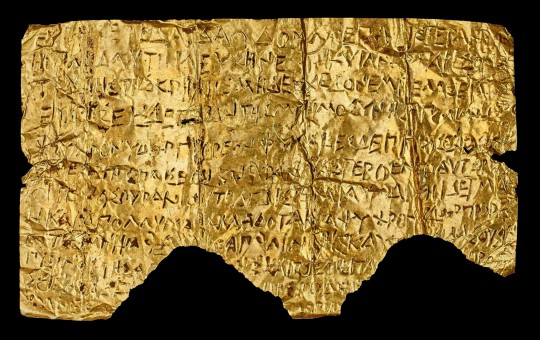
This little tablet was crafted from a sheet of gold foil, and it measures just 4.5cm long. It was found in a small pendant case in Petelia, Italy; the tablet itself dates back to about 300-150 BCE, but the pendant case and chain were likely made about 400 years later, during the Roman era.
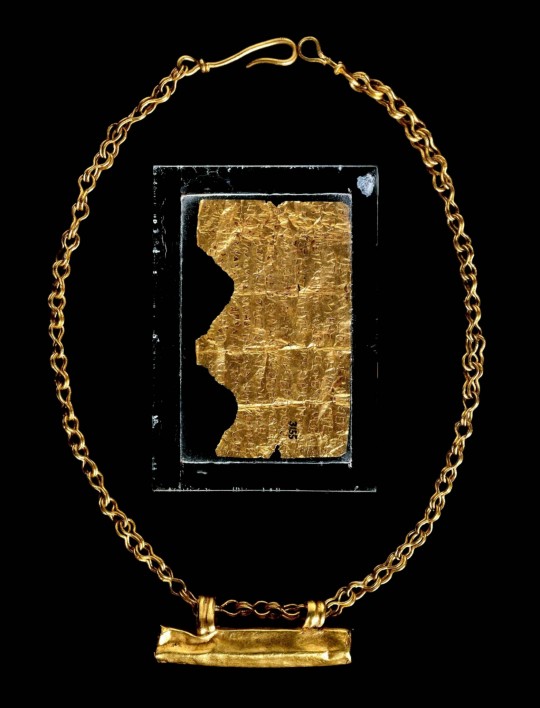
Above: the Petelia tablet and the capsule-like pendant case in which it was discovered
Experts believe that the tablet was originally buried with a human body, and that an unknown individual later removed it from the burial site and stuffed it into the pendant case. Unfortunately, they simply rolled it up and snipped off the tip of the tablet in order to make it fit, and the final lines of the inscription were destroyed in the process.
This type of textual amulet is often described as a totenpass or "passport for the dead." Totenpässe were supposed to be used as roadmaps to help guide the spirits of the dead as they journeyed through the Underworld, and they were also meant to serve as indicators of the elite or even "divine" status of certain individuals, providing special privileges and allowing them to obtain an elevated position in the afterlife.
This particular totenpass is incised with a Greek inscription that reads:
You will find a spring on your left in Hades’ halls, and by it the cypress with its luminous sheen.
Do not go near this spring or drink its water. You will find another, cold water flowing from Memory’s lake; its guardians stand before it.
Say: "I am a child of Earth and starry Heaven, but descended from Heaven; you yourselves know this. I am parched with thirst and dying: quickly, give me the cool water flowing from Memory’s lake."
And they will give you water from the sacred spring, and then you will join the heroes at their rites.
This is [the ... of memory]: [on the point of death] ... write this ... the darkness folding [you] within it.
The final section was damaged when the tablet was shoved into the pendant case; sadly, that part of the inscription does not appear on any of the other tablets that are known to exist, so the meaning of those lines remains a mystery (no pun intended).
Tablets with this motif are also known as "Orphic lamellae" or simply "Orphic tablets," because they were traditionally attributed to an Orphic-Bacchic mystery cult.
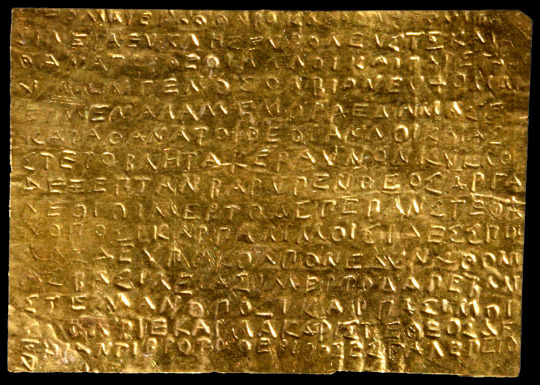
Above: orphic tablet from the Necropolis of Thurii, in modern-day Italy, c.400-300 BCE
Only about 40 orphic tablets are known to exist, and they are all made from sheets of gold. The inscriptions vary, but they generally include references to a cypress tree, a spring that must be avoided, another spring known as the "Lake of Memory," the sensation of thirst, and a conversation with a guardian (or another entity that is associated with the Underworld, like the goddess Persephone) in which the dead must present themselves as initiates or divine individuals before they are permitted to drink from the Lake of Memory, which would allow them to obtain privileges reserved only for the elite.
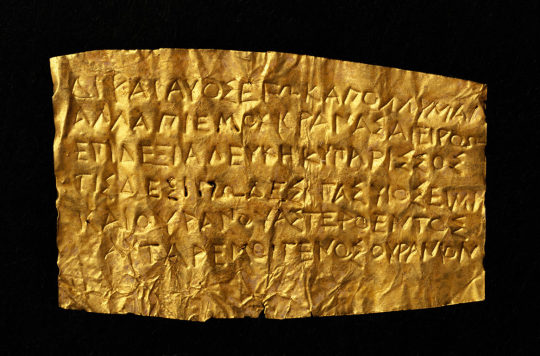
Above: orphic tablet from Tassaglia, Italy, c.350 BCE
The details of that reward are unclear; orphic tablets may have been viewed as a way to gain access to the Elysian Fields, to participate in certain sacred rites, or to break free from the eternal cycle of reincarnation. Regardless of the specific details, the overall objective was likely the same: to obtain a special status and acquire privileges that were inaccessible to most of the souls in the Underworld.
Note: I've been trying to go back and edit/fix the original "Petelia Tablet" post that I published on this blog about 2 years ago, but none of my edits are going through for that post, so I'm just submitting this as an updated and much more concise version
Sources & More Info:
The British Museum: Tablet and Pendant Case
Atlas Obscura: The Ancient Greeks Created Golden Passports to Paradise
Getty Museum: Golden Tickets to the Underworld
Getty Museum: Underworld: Imagining the Afterlife
Bryn Mawr College: Festivals in the Afterlife: a New Reading of the Petelia Tablet
#archaeology#artifacts#petelia tablet#history#anthropology#ancient greece#totenpass#orphic tablet#religion#greek mythology#afterlife#greek underworld#literal ticket to paradise
87 notes
·
View notes
Text
Last line challenge tagged by @chiptrillino !! 🫶🫶🫶

tagging: @seasideoranges @escyn @kibutsulove + anyone else who wants to share!!
64 notes
·
View notes
Text

i might be thinking too much about this rather irrelevant background story for the ancient queen and ganondorf (.. yes still botw2/totk rewrite ................ its background stuff you dont get to see, it would just be a line in a hidden diary and some environtmental story telling- that bracelet being in his room- wrote a longer text post about it today but uh .. heres a doodle that took me too long to make bndksbnsd)
#ganondoodles#art#zelda#doodle#ganondorf#ganondoodles rewrites totk#botw2#i hope using that tag is fine#i dont even know if im gonna give this rewrite an actual name#though i did think about leaving it the same but the 'tears' being tears as in ripped apart#but how would i make that clear in written form lol#any YES i am thinking too much about tiny background details that are optional to find#i like the idea of having both quests for lore enthusiasts and those that only care about gameplay#and yes my pattern of pairings is showing .........#the only thing i like about rauru was the possible ship with ganondorf bc it made the 'story' mildly more interesting#and i didnt change that to not make it gay (hello? who am i??)#but bc 1. i wanted to give the sonia figure (here ancient zelda) the main part 2. .. she is the one with sealing powers#the colors always look better on my tablet but i think its calibrated right- i did somethign with my desktop screen once though#so im hoping it looks normal for everyone else#anyway- goodnight (1am gang lets goooo)
143 notes
·
View notes
Text

Always loved his heart station art and wanted to take a crack at the pose
#ventus#ven#kh#kingdom hearts#bbs#birth by sleep#I didn’t realize how much my ancient tablet was holding me back actually…. so easy to make smooth lines now#I feel like it looks more confident…. idk
126 notes
·
View notes
Text
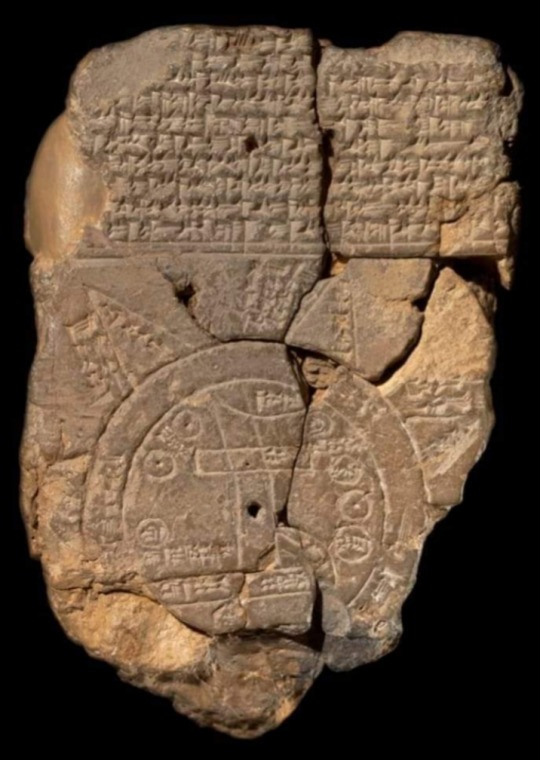
Babylonian Map of the World (6th century BC), also known as Imago Mundi, is oldest clay tablet map written in Akkadian.
The tablet describes the oldest known depiction of the known world.
It was discovered at Sippar, southern Iraq, 60 miles north of Babylon on east bank of Euphrates River.
This map not only serves as a historical record of the region's geography but also includes mythological elements, providing a comprehensive view of the ancient Babylonian worldview.
Today, the Babylonian Map of the World is housed in the British Museum, where it continues to be a valuable artifact for understanding the ancient past.
Details of the map:
1. “Mountain” (Akkadian:šá-du-ú)
2. “City” (Akkadian: uru)
3. Urartu (Armenia) (Akkadian: ú-ra-áš-tu)
4. Assyria (Akkadian: kuraš+šurki)
5. Der (Akkadian: dēr)
6. Swamp (Akkadian: ap–pa��ru)
7. Elam (Akkadian: šuša)
8. Canal (Akkadian: bit-qu)
9. Bit Yakin (Akkadian:bῑt-ia-᾿-ki-nu)
10. “City” (Akkadian: uru)
11. Habban (Akkadian: ha-ab-ban)
12. Babylon (Akkadian: tin.tirki), divided by Euphrates
13. Ocean (salt water, Akkadian:idmar-ra-tum)
#Babylonian Map of the World#Imago Mundi#clay tablet map#clay tablet#Akkadian#Sippar#Iraq#British Museum#history#mythology#map#Archaeo Histories#Ancient Babylon#Babylonia#geography#artifact
563 notes
·
View notes
Text
Blood Incantation - The Vth Tablet (Of Enûma Eliš)
#Blood Incantation#Interdimensional Extinction#The Vth Tablet (Of Enûma Eliš)#EP#Release date:#August 29th#2015#Genre:#Death Metal#Themes:#Humanity#Enlightenment#Mysticism#Metaphysics#Ancient aliens#Annunaki mythos#USA
37 notes
·
View notes
Text

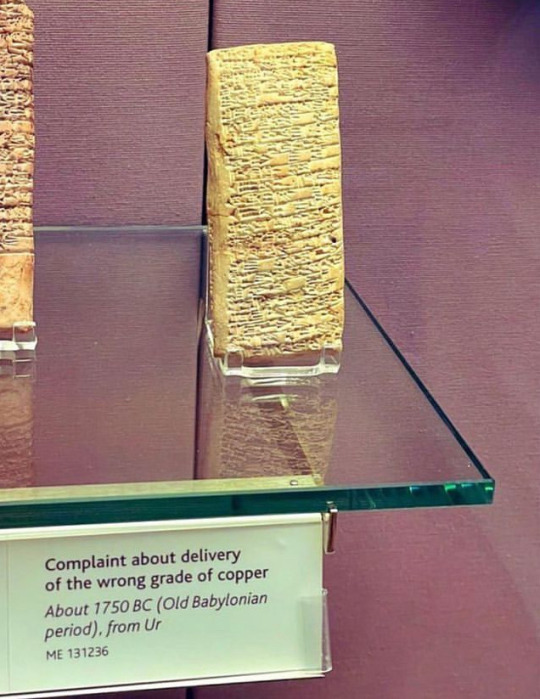
im going insane over this tweet because absolutely no one in the comments knew about ea-nasir?? no one had even heard about this or seen this photo before?? like??? i fully forgot that the story of ea-nasir and his mid copper is not an important historical event outside of tumblr dot com. i feel like i’ve been transported into a different and worse reality and i would like to go back
#also the way i’ve seen that exact photo before from someone’s tumblr post about it#this is making me insane#the way things travel from tumblr to other sites is just. so fucking weird#what do you MEAN you dont know about ea-nasir and his copper what do you MEAN#twitter#x (twitter)#ea nasir#ancient history#babylonian history#copper#clay tablets#heritage post#heritage posts#.txt#alex talks
332 notes
·
View notes
Text
The "Emerald Tablets" of Thoth 🤔
#pay attention#educate yourselves#educate yourself#knowledge is power#reeducate yourselves#reeducate yourself#think about it#think for yourselves#think for yourself#do your homework#do your research#do some research#do your own research#ask yourself questions#question everything#emerald tablets#hidden history#history lesson#history#ancient history#history is a lie#everything is a lie
60 notes
·
View notes
Text
my art tablet felt bad to use the past few weeks and I couldn't figure out whether the calibration was off, the brush settings needed constant adjusting, or if my eyes were getting worse.
It was the driver. I had to uninstall and redownload a new driver

This is the best example I have of the difference the update made.
#this sounds dramatic but drawing on the tablet felt SO BAD BEFORE#All of my sketches were looking flat. the line weight wasn't matching on the screen how I wanted it to look in my head#I was panicking because I thought my hand-eye coordination had atrophied or something#sketches#herbgerbart#my art#not fandom#unless you're in the ancient greek fandom in which case RISE#I was reading a lot about the children of king priam#dawg had three kids (two believable) who were oracles and still let the tragedies happen. incredible
42 notes
·
View notes
Text
As above, so below;
As within, so without;
As the universe, so the soul
- Hermes Trismegistus
#shadow work#quotes of wisdom#philosophy quotes#emerald tablet#philosophy#the kybalion#shadow work quotes#hermes#hermetic#hermes trismegistus#psychology quotes#psychology#shadow self#spiritual truth#spiritual awakening#spiritual quotes#alchemy#ancient wisdom#witchblr#spiritual wisdom
71 notes
·
View notes